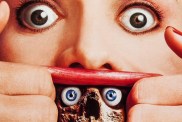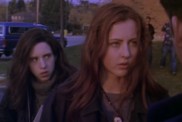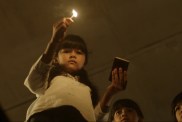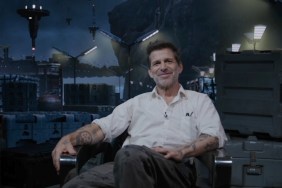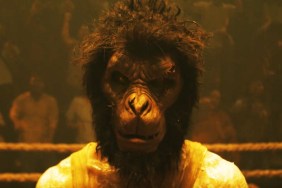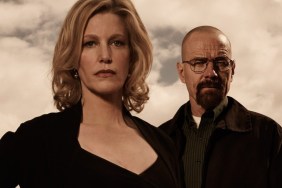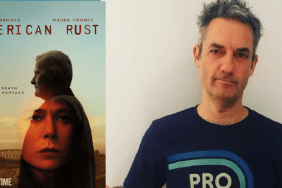It may be a number of years before the name “Fred Cavaye” will be as well known among Americans as some of his French peers like Luc Besson, Olivier Assayas, etc., but that’s certainly going to change the more that Americans have a chance to see his new action-thriller Point Blank.
A tightly-scripted tense action thriller, it follows the journey of male nurse Samuel, played by Gilles Lelouche, who must try to rescue his pregnant wife after she’s kidnapped by criminals who want to get back their injured colleague, played by Roschdy Zem, who is being held under police surveillance at Samuel’s hospital. It leads to a chase across Paris, as Samuel gets deeper and deeper into a conspiracy and cover-up that involves the police and a well-respected local businessmen.
Already, Cavaye’s first film Anything for Her (or “Pour Elle” as it was called in France) was remade by Oscar-winning filmmaker Paul Haggis as The Next Three Days with Russell Crowe and Elizabeth Banks, without ever having received any sort of U.S. release. Point Blank is similarly the type of easy-to-sell premise–imagine something along the lines of Taken or The Bourne Identity–that one can probably expect Hollywood to come calling once the movie gets out there.
ComingSoon.net got on the phone with Cavaye a few weeks back for the following discussion of his latest film and his future plans (with the help of an interpreter):
ComingSoon.net: “Point Blank” is your second movie but you kept in the same genre as your first movie, an action thriller, so was that a genre you’re just naturally drawn to?
Fred Cavaye: Yes, it’s a genre that I like, because what it does is it enables you to deal with a whole lot of different subjects or themes. You deal with situations of fear, you deal with laughter, you deal with tears, and it’s something that really lets you take the emotions very far. It’s also in a film with suspense, it’s got an entertainment value as well because you’re there, and it’s suspenseful and you’re wondering, “Is the hero going to rescue his wife? Is the hero going to remain alive until the end of the film?” So this is all part of it. This is why this genre appeals to me.
CS: Was this the same producers and team who put together your last movie as well?
Cavaye: In this case, it’s the same co-writer on the script but it’s a different producer. The only reason the producer is different is that I actually began to work on this film before I began to work on “For Elle” (note: the actual American title is “Anything for Her”) but because it was somewhat expensive to make, I decided to develop “For Elle” so that became my first film, it was a less expensive film, and that was done with a different producer. But once “For Elle” was successful, my first producer came back to me and said, “Okay, now we should be able to make this film,” so that’s why “For Elle” became the first film and “Point Blank” became the second film. As for my next film, and for that I will have both the same co-writer and the same producer.
CS: That’s interesting because the premise for this seems like the kind of movie that would be very easy to sell in Hollywood, and I was curious about how easy or hard it was to get a movie like this financed in France. I assume it’s more expensive than many of the films made there.
Cavaye: Actually, in France, it is much more complicated to be able to finance a thriller than a regular kind of film. Thrillers were very fashionable in the 1950s and ’70s in France but then they fell out of fashion, and the thrillers that were produced were not really very successful. I think in the last ten years, there’s been a return to the thriller as a successful genre. My films have been a success and I’m thinking also of the film by Olivier Marchal, “36th Precinct,” which was also a thriller, and I think that’s really helped to promote their popularity, but still, it’s more difficult to make this type of film in France.
CS: You wrote this script a while ago, and it’s such a complex story with every scene taking place in a different location, so how did you approach that as a director while shooting?
Cavaye: Yes, it was a very difficult process, because what I wanted to do was I wanted to shoot a film but also within the dimensions of the idea of the film, I wanted to do things a little differently. For example, instead of having a car chase, what I thought would be much more interesting would be to have the same kind of chase but have it on foot. So there again, it’s something where I’m using sets that are natural sets. We’re not working in a studio, so that of course, complicates things. In addition to which we didn’t have a big budget for this film, and so because we’re low budget we didn’t really have a lot of time in which we could shoot, so we had to really do a lot of preparation before beginning the shoot. I worked with my DP and with the producers and we were really able to do as much prepwork as we could in advance, so we could maximize the time we had available to do it. But it was a difficult process.

CS: What about casting Gilles Lelouche? He’s probably in huge demand because of “Tell No One” and other films, so how did you approach him and did you know if he’d be able to do his own stunts?
Cavaye: This was actually Gilles Lelouche’s first starring role, and it’s the first time he was the main actor in the film and I think it was a good choice and I trusted in that choice, and the producers saw that I was right because now he’s being offered a lot of starring roles. This was really his first major starring role, and as far as him doing his own stunts, I think what was really important was that what I was looking for was an actor who would be very involved in his own character, in his own work on the screen. What I didn’t want was for the viewers to get a sense that I was cheating like, “Oh, there’s his double doing the stunts.” By really having Gilles do that, you see him, you know that he’s the one doing it. It really makes you identify much more closely with him. In a way, it’s interactive almost in a way that a video game is where you see him running on the escalator and you see him running down the platform then you know he’s the one doing it, and I think that adds a great deal to the viewer’s experience of the film. We want them looking at this film and saying, “Oh, no, there’s too much tricks.” We really want it to be authentic, and he was an actor who was willing to put himself in that position.
CS: It absolutely makes a huge difference. Does your co-writer Guillaume get involved in the casting process at all and when you’re writing, do you throw around ideas of who could play certain roles?
Cavaye: No, we didn’t really do it together, and actually, when I was writing the script for this film, I myself was thinking first of Roschdy Zem for the role that Gilles Lelouche plays, the role of the nurse rather than the gangster, and I realized I wasn’t thinking, because that really wasn’t the role for him. He really was perfect for the role of the gangster. I don’t really like to anticipate which actors would be perfect for the role, because then if they turn you down, it can be very disappointing. I think my approach is that I like to not think about it until the script is actually finished, but this is really something that depends on the individual director, but for me, I must finish the script before I begin to think about the actors or what those choices should be. On the script I’m working on now, I’m really making myself not even think about what possible actors could be in it.
CS: I was curious about some of your influences, particularly when it comes to the pacing of the action. When you’re making any sort of thriller, Hitchcock is one of the names usually mentioned, but I’m curious more about the action influences and what movies inspired you in that sense.
Cavaye: I think the film that really changed the way action films are viewed and are made now was the “Jason Bourne Trilogy.” I think the way we view thrillers is really not the same after Jason Bourne, and the proof of this is if you look at the new James Bond film “Casino Royale,” because it’s filmed in a new style. Now, for once, you find that you’re afraid for the character. “Is something going to happen to him?” and I think that this element of having so much identification with the character and being fearful about what the outcome will be is something that makes it a much more credible film. I think that’s really where the change comes from, it was really the Jason Bourne films that brought that into play. As far as other influences, I think that probably with all of the action films that I’ve seen, there probably are influences from other films, but I think probably more on an unconscious level then on a conscious one.
CS: Do you watch any of the Hong Kong crime thrillers and are you familiar with them?
Cavaye: Actually, I’ve seen some Hong Kong films but I’m not really a specialist in Asian films. Although I’ve seen some, I don’t really know them that well. On the other hand, I’ve seen many, many American thrillers and action films, and also a lot of French film. I’ve seen many French thrillers from the ’60s to the 1970s to 1980s, films by Jean-Pierre Melville, Alan Caudenot, and these are films that also probably had an influence.
CS: The main plot of the movie involves a man trying to rescue his pregnant wife and later in the movie, she’s involved in a lot of violent scenes. I wondered if there was any kind of pushback about that. I don’t know how it is in France but in America, we don’t want to see pregnant women in any kind of danger, and it’s really a bit risky to do that, so I wondered if that posed any problems getting the movie released.
Cavaye: Actually, what my job is as a screenwriter and as a director is to find things that are going to maximize the fear the viewer starts to feel, and it’s a question here if it’s a pregnant woman that’s threatened, people are even more fearful, so my idea in having the character be pregnant was not to deal with something that’s ordinarily taboo, but really to maximize the fear level in the film. I think it’s important to remember that in the end, it’s just a film, it’s not reality, but I have to say that the reactions of some of the people in France was pretty much the same as people in the United States. It’s kind of like when you go to an amusement park and you’re in the haunted house and you get scared, you want to maximize that feeling of fear, and that was really why it was done here. The film was prohibited for very young children to see, but other than that, there was no other kind of solution that was proposed.

CS: Why did you decide to put an epilogue at the end and wrap things up the way you did?
DEFINITE SPOILERS IN THE NEXT RESPONSE!!
Cavaye: I’m not being mendicant here, but I didn’t want to abandon my characters at the end. I wanted there to be some kind of a resolution, and I wanted the bad character to have to pay for what he did. You know when you see this that the bad person is going to pay and that Roschdy Zem is going to have his vengeance. The scene that I particularly like is the scene between Roschdy Zem and Gerard Lanvin, because you know when you see them together and you hear the radio in the background, you know there’s going to be this enormous fight, and you know that in the end, all things will return back to order. In a way, I’m an enormous fan of Westerns and for me, this is almost that kind of an ending where everything is resolved the way it should be.
END OF SPOILERS!
CS: Your previous movie “Pour Elle” was remade in America last year. I can’t imagine this movie wouldn’t be of interest because it has another great premise, and someone will want to remake it. What were your experiences with having one of your previous movies being remade in Hollywood? I know I saw “Next Three Days” before your movie. How did you feel about that remake and how do you feel about this one possibly being remade if it comes up?
Cavaye: I felt the remake of my first film was actually a great experience for me. I found it very flattering that a great screenwriter and director like Paul Haggis chose to remake it. What was really important for me was the fact that he was both a director and a screenwriter, because he’s someone who considers both to be equally important, as do I. In that sense, it was even more flattering for me that someone like him chose to do the remake of the first one. I saw the remake, and I think it’s very interesting to see a remake of your own film. For example, there were scenes in the remake that I would have liked to have written myself, for example the scene between Russell Crowe and Elizabeth Banks in the prison. It’s interesting to see your work remade in that way. There have been proposals to remake the current film, “Point Blank,” nothing finalized yet, but there have been several proposals that have been made. I find it really amusing and interesting the fact that I’m a French filmmaker who has been very much influenced by American action films and thrillers, so I make a French film in an American style, and then I’m approached by American companies who want to remake a French film back into an American film, so it’s like coming full circle.
CS: Have you been approached yourself to direct American films, or do you always want to work from material that you’ve written yourself?
Cavaye: Since I consider myself as much a screenwriter as I do a director, of course I’m interested in directing films that I write myself, but I don’t have any negative feeling about the fact that if someone has written a screenplay that’s really something very close to something I would have liked to have written myself or that I would have written myself, I would have no problem in directing a film like that. I think it’s very important to never close the door on anything but always leave yourself open to options and to see what it is you want to do. If the script appeals to you and it’s something you can relate to, I don’t see why not.
CS: You’re working on another script right now, so is that going to be in a similar style and genre as your previous films? Is it also an action thriller?
Cavaye: Yes, it is another thriller, but in this case, it’s not a thriller about an ordinary man who is trying to rescue his wife. There is no rescue in this one. This one is really a story about two cops, and these cops have maybe committed some actions that were not very good and they’re trying to redeem themselves, so it’s really a story about two cops and their redemption, and it’s set in a police procedural kind of context, this other film. There’s nobody trying to rescue anyone.
Point Blank opens in New York and Los Angeles on Friday, July 29.
